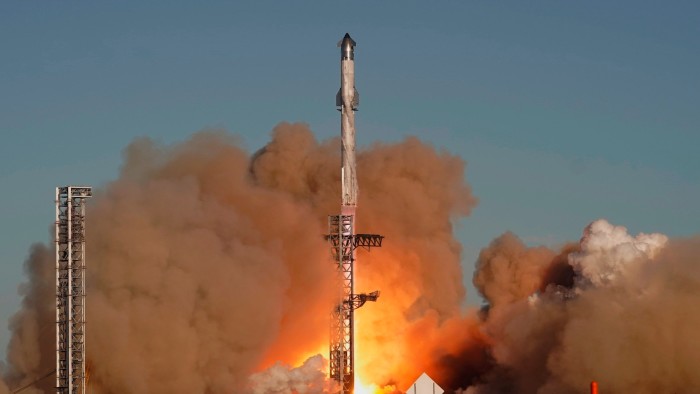Unlock the Editor’s Digest for free
Roula Khalaf, Editor of the FT, selects her favourite stories in this weekly newsletter.
SpaceX has been ordered to pause launches of its Starship rocket while the company and the Federal Aviation Administration probe the cause of an explosion shortly after lift-off in Texas on Thursday.
“The FAA is requiring SpaceX to perform a mishap investigation into the loss of the Starship vehicle,” the regulator said on Friday. “There are no reports of public injury, and the FAA is working with SpaceX and appropriate authorities to confirm reports of public property damage on Turks and Caicos.”
Dozens of flights were slowed, diverted or delayed by the FAA as the debris fell from the explosion in space above the northern Caribbean region. Videos posted on social media showed it spectacularly disintegrating in a shower of flames.
SpaceX described the incident as “a rapid unscheduled disassembly”, with initial data indicating a fire developed in the aft, or back, section. The debris had fallen “into the Atlantic Ocean within the predefined hazard areas”.
The failure “served as a reminder that development testing by definition is unpredictable”, SpaceX added. Elon Musk said “success is uncertain, but entertainment is guaranteed” in reply to videos of the incident.
The incident was a setback for Musk’s $350bn space technology company just hours after a successful launch by rival Jeff Bezos’s Blue Origin.
However, SpaceX did manage to execute another successful “catch” of the flight’s reusable rocket booster stage in its giant “Mechazilla” robotic arms on its return to Earth.
In a post on his social media platform X, Musk said the main rocket’s failure might have been due to an oxygen or fuel leak in the firewall of the ship’s engine, adding: “Nothing so far suggests pushing next launch past next month.”
The FAA said that it “will be involved in every step of the SpaceX-led mishap investigation process and must approve [the] final report, including any corrective actions”.
“A return to flight is based on the FAA determining that any system, process, or procedure related to the mishap does not affect public safety.”
The flight was the seventh test launch of a Starship, a 400ft rocket powered by Raptor engines that first reached space in November 2023.
The incident came shortly after the successful maiden launch of Blue Origin’s smaller New Glenn rocket, backed by Amazon founder Bezos, who is challenging Musk in the satellite launch market. The launch of New Glenn came five years later than originally planned.
Earlier on Thursday, Bezos wished Musk and SpaceX luck in a post on X.
SpaceX became the world’s most valuable private start-up a month ago, receiving a $350bn valuation in an employee stock sale. That marked a significant jump from its $210bn valuation just six months earlier.
Investors rushed to back SpaceX in part because of Musk’s proximity to the incoming US president Donald Trump, according to people with knowledge of that deal, leading to a “Trump bump” in the valuation of various Musk entities.
SpaceX has led the race to commercialise space flight, making strides towards Musk’s ultimate ambition to develop reusable rockets and make the human race “multiplanetary”.
Founded in 2002, it became the first private company to transport people to the International Space Station in 2020. Last year, SpaceX was called upon to return stranded astronauts from the station.
Read the full article here




